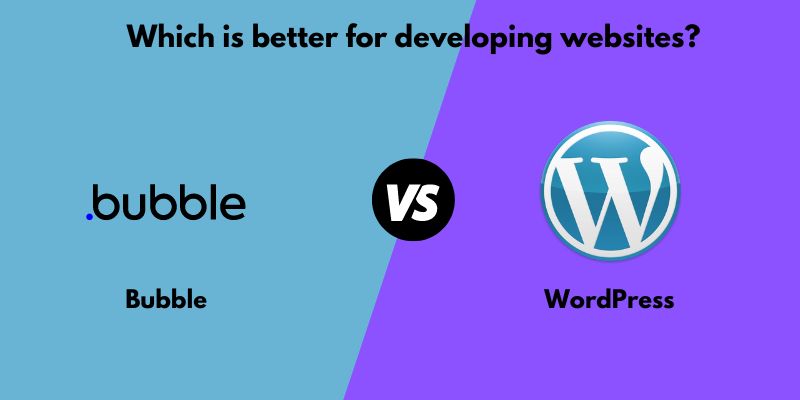
Whichever Is Better Bubble vs WordPress?
In this article, we will be able to compare two splendid patterns and two extraordinary patterns in each category. There are many examples of such choices, for example, WordPress vs Bubble. The aim is to show which of those tools is better for an e-commerce site or any other kind of online store. Both software products pay much attention to the blanks needed to develop such kind of website. Their approaches, however, are completely different.
Thus, Bazley identifies that Bubble can be referred to as site-building that may allow the creation of new applications, including e-commerce ones. WordPress helps its users create websites in the traditional definition of the word, meaning websites in the form of smaller web applications. Which has more powers, the preferential or the proportional? To discover what this solution is, we need to take a closer look at both possibilities.
Overview of Bubble vs WordPress in General
WordPress is a more established option than Bubble. Developers formed site-building technology in 2012 when it advanced to a high degree of usability and no code development.
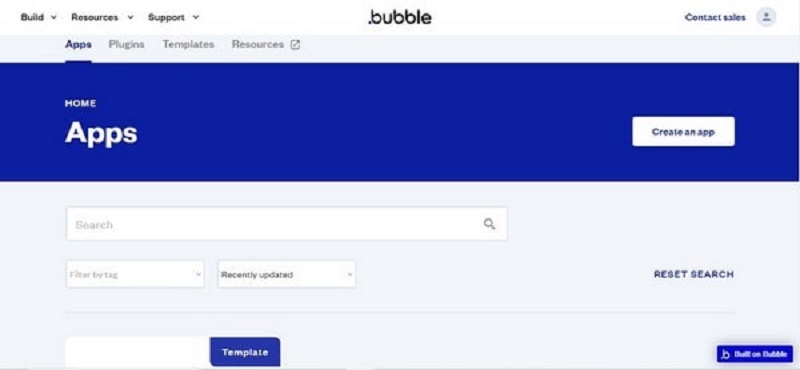
Bubble software is a cloud-hosting platform that primarily uses a visual programming architecture. It’s a type of programming language with a user interface that’s simpler. Since writing code is optional for the entire process, this creates a lot of options for non-programmers and amateurs in web design. Users of the program may design basic apps of any kind. It might be an online store, social network, portfolio, service platform, or anything else.
In 2003, WordPress was created with bloggers in mind and underwent a protracted development process. Its core doesn’t change, though. The CMS platform is an open-source site construction tool that relies on code modification and plugin usage to create websites.
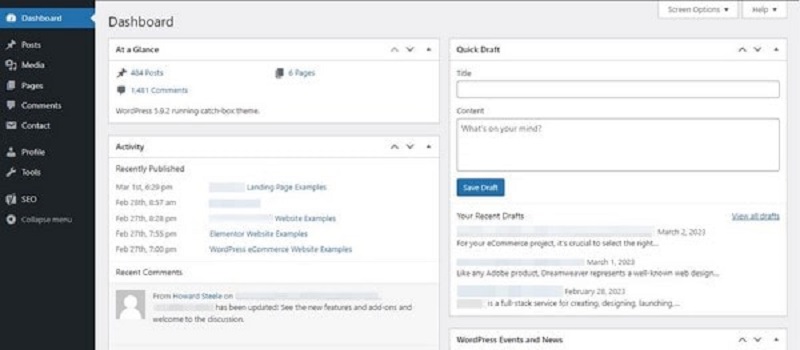
With WordPress, the options are virtually infinite. WordPress users have complete creative control over the layouts and styles of their web projects. WordPress lets you outfit a website with all the features you need, regardless of the purpose it serves. Therefore, creating a strong, eye-catching eCommerce website is well within its capabilities.
Let’s provide a little overview first. For straightforward and rapid fixes, Bubble offers a fantastic option. If you need to transfer a complicated project online, WordPress works better.
Between WordPress and Bubble, which is easier to use?
The Bubble team created the software with non-techies in mind. The software’s easy-to-use creation process allows even users with no prior coding experience to handle all of the tools it offers.
The Bubble user interface is really practical. There are a ton of step-by-step guides available for users to learn how to create apps similar to Shopify, ZenDesk, Instagram, LinkedIn, and other platforms. You begin by registering on the site, after which you immediately begin the construction process.
Drag & Drop technology is the foundation of the entire job. Even though you won’t have as many modification options as you would with WordPress and similar platforms, you may rapidly create an application that is appropriate for an online store. Generally speaking, you can’t go wrong since Bubble limits how much you can experiment with.
The platform will handle the SEO and security of your app. You will at least need to make some adjustments. The other possibilities are comparable in this regard. The platform will also provide hosting for your online store.
WordPress provides a whole new methodology. The person who has a particular vision for their internet shop will get the most from this. WordPress offers the resources to enable the developer to bring any concept, no matter how intricate and unique, to life.
Here, being able to code is essential. It will enable you to fully utilize the platform’s capability or that of a hired specialist. A design should come to you, and you should know how to use computer languages to make it a reality. For your project, you should devise a strategy that addresses security, visibility, mobile responsiveness, functionality, and scalability. You bear full responsibility for all of this.
Bubble vs WordPress Layout and Adaptability
Thus, it is not a process of getting ads to establish an acknowledged internet store that is willing to make the money. First of all, your project requires a unique, must-be-pointing-to-e-commerce design that looks professional. Next, its importance is crucial for measuring work effectiveness against all other factors. Finally, how well do WordPress and Bubble fare from this viewpoint? It will bring greater clarity to the situation if I provide a brief description of typical converter characteristics and the possibilities for their modification.
Building a Website (PWA)
With Bubble’s assistance, creating an online store app is simple. It is possible to construct an online store from scratch as well quickly. The following are the actions that you must take:
- The future online store’s structure is something you specify. Bubble offers example databases that you may edit by adding more folders based on the requirements of your shop.
- To improve the functional capabilities of your eStore application, you create processes.
- You design your application’s pages and provide the necessary components to specify its layout and functionality. There is no need for head-twisting because everything can be produced with Drag & Drop.
- You build the checkout page and add your goods to a shopping cart.
- Payment gateways are connected.
- You provide dynamic blocks for your online store to improve the overall appearance of the application.
- It’s time to launch your application.
A novice can select an option that is easy to understand and accomplish. They can also use a bubble template that has already been prepared. The template defaults to your overall security, mobile responsiveness, and Search Engine Optimization. With just a few style alterations and numerous related plugins, it will be simple to make a rather plain, however excellent-appearing, full-fledged online store.
While using WordPress, the creative process is more complex than just putting words on paper. To host a WordPress CMS, one requires a hosting plan and a domain name to host the site/website as per choice. To make it simple, employing your domain interface, a majority of servers will let you install WordPress with a single click into the correct directory folder. This is attractive because the program is free to download from the official website and is even open-source.
The only way to make it even better is by altering the code to achieve some of the enhanced looks you want for your website. Of course, if you are willing to utilize a free theme, then you are welcome to do so, but remember that this is your online business, and it is crucial to show your clients the best side, and that is achievable with a premium theme. Other e-commerce plugins like the renowned WooCommerce may be necessary. Only your imagination bounds the possibilities here.
Security and visibility of your website, as well as other specifics, will be directly in your hands. You can then upload your website after that. If you wrote or designed something incorrectly, you find yourself going back to fix that particular issue. Recognizing what you want and how to attain it is a good approach to WordPress.
Features of eCommerce
A probable solution would be the creation of an online store with the help of the Bubble application. The workflow is one of the most positive attributes of the platform. The ever-important thing is that you can fine-tune every process in your application with this feature. In a way, it can perform all the functions that a normal online store can do, such as processing orders, accepting payments, and even extensions, as well as numerous APIs.
You want to manage your expectations regarding this term, though some of the courses won’t require you to write any code at all. You will thus have very limited authority on Bubble. Still, why not turn to a more effective tool, such as WordPress, with coding begging? Even if Bubble offers more plugins than any other platform, it could never provide the flexibility offered by WordPress, the most used globally, which has dedicated e-commerce extensions as well.
Therefore, it is possible to incorporate the WooCommerce plugin to begin your WordPress web store. Its purpose is to create e-commerce projects that are efficient and equipped with capabilities such as these:
- Whatever gateways for payments
- Instruments for inventory management
- Possibilities for drop shipment
- A trolley for groceries
- The abandoned cart retrieval device
- Plugins for email marketing
- Tax calculators, among many other tools
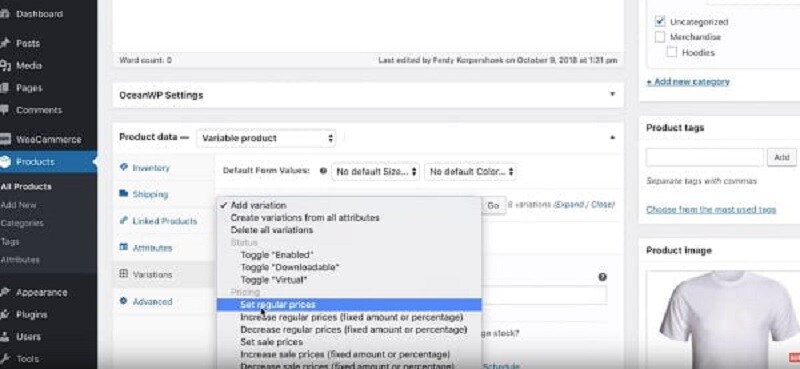
The bubble is unable to match that degree of integration. When you have your tools, either made by you or by an expert, and you need to mould them into a certain application, the program works well. You can create a store website with WordPress and add as many third-party and WordPress plugins as you like to it.
Editing Templates
Templates nicely, and this is where Bubble has very little ability, as demonstrated by its templates. But, and this is important, their phone number is one of many problems here, too. On the one hand, the Drag & Drop editor makes it possible to modify bubble templates easily; however, the designs themselves are too symbolic. You may select a generic design that you can further edit; however, almost all of the free designs may require some programming knowledge. However, you may also need help with the modification process.
But, most importantly, the point that you have to select the template for your app is still another disadvantage. In other words, if they become necessitated, you will not be able to substitute them with another. Bubble is unsuitable for creating an online store because it has a small library of built-in themes for eCommerce sites.
On the other hand, one has the choice of using a myriad of themes that are officially supported, as well as those developed by third parties. Over 31,000 people run it at the moment, and free ones make up approximately a third of the total. As for the site builder, no one could offer you the same diversity of skilled eCommerce themes, paid or free.
If you prefer, you can start your table from scratch and find out how to construct it in this section. Indeed, WordPress may also be utilized for this. Bubble does not allow it. The latter will only allow you to use a basic template where you can more or less freely insert components that are easy for all to complete.
Comparison between Bubble and WordPress General Pricing
Bubble has a free plan in addition to four expensive ones. Even the most basic internet store couldn’t really use the free plan because of its extremely restricted feature set. The following packages are part of the paid plans:
- Personal: $29 monthly.
- Pro: $129 monthly.
- Output: $529 per month.
- Managed: customized prices
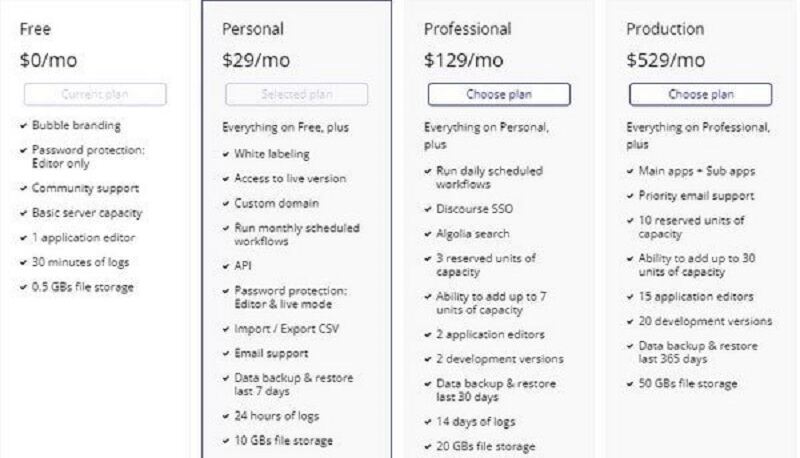
You should select a more expensive subscription if you want your Bubble app to have additional features. WordPress is a free website builder. That means there is no cost associated with downloading, installing, and using the program. This version of WordPress does not have any premium plans; however, the WordPress.com version does.
Since WordPress is self-hosted, you’ll need to pay for hosting, a domain, pro themes, and premium plugins. The platform offers a plethora of free alternatives so that you can keep your costs to hosting and a domain.
WordPress vs Bubble: Which Is Better for SEO?
By assessing the ability of Bubble SEO to offer solutions to these problems, it was evident that what they had to offer needed to be revised and advanced for beginners. Although the program permits you to adjust settings relating to the search engine, be cautious when approaching this particular section, as it should only be done intentionally.
You will also have to handle your SEO proactively on your own if you use WordPress mode. On the other hand, you can also make it faster and more completely simplified by linking your website with SEO-managing plugins that are known to be more efficient, such as Yoast. You may do the following manipulations with it.
- Modify the headers, URLs, meta descriptions, and other elements of your pages;
- Using analytical tools to evaluate the SEO efficacy of your content;
- Obtain recommendations for enhancing your SEO settings;
- Obtain recommendations on important words;
- Make sophisticated sitemaps;
- Inspect and improve the readability of the pages, etc.
Conclusion
Summing up, I want to state that both WordPress vs Bubble have their strengths that achieve various purposes and can be helpful in different contexts. WordPress does the best in terms of adaptability, content handling, and plugin availability, and when it comes to app-building and fast prototyping, the winner is Bubble. The decision between the two types of plans depends more on the particular needs of the activity that is to be accomplished.
In the end, ask yourself questions such as: Which goal could be deeper? Is your technical skill set better suited for this option? Which long-term plan seems more feasible? Both of these platforms have their advantages when it comes to overall functionality, flexibility, and the ability to develop the application quickly. By grasping these differences, it will be possible to make rational decisions supported by the goals desired by the person. When choosing the platform for further work, determine how each/which one can be most useful for digital projects, and do not hesitate to turn for help to the guidance or ideas of the Edworking community.
Our recent articles:-
Read: Weebly vs WordPress: Which Website-Building Platform Is Better?